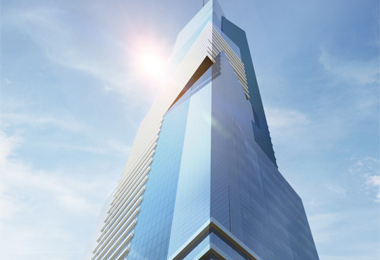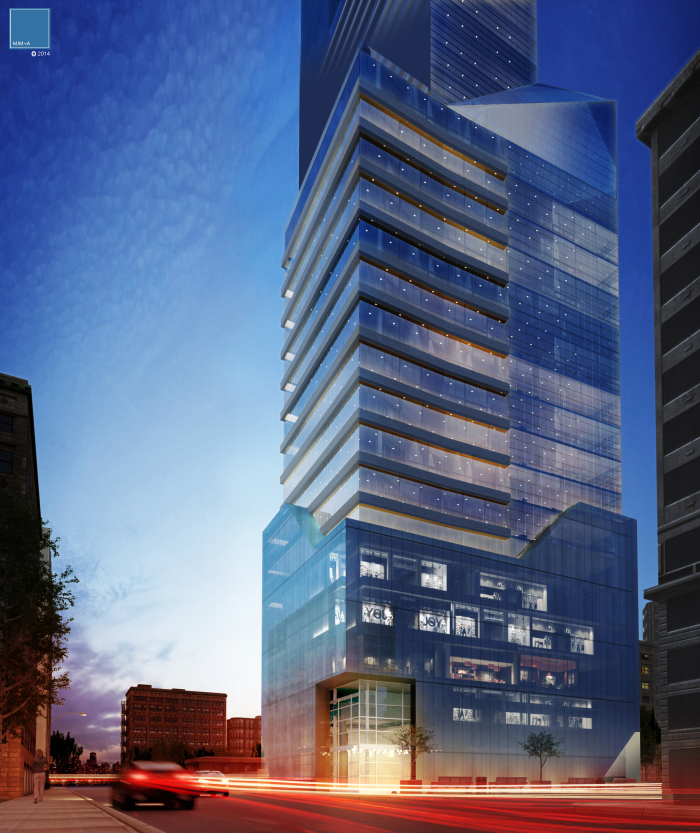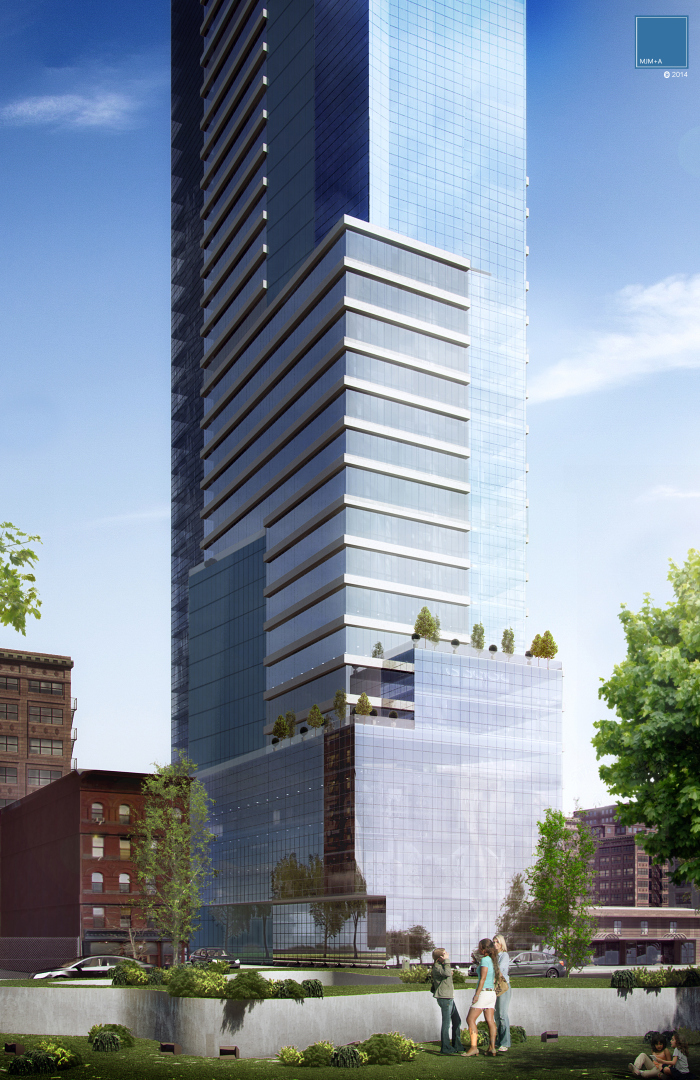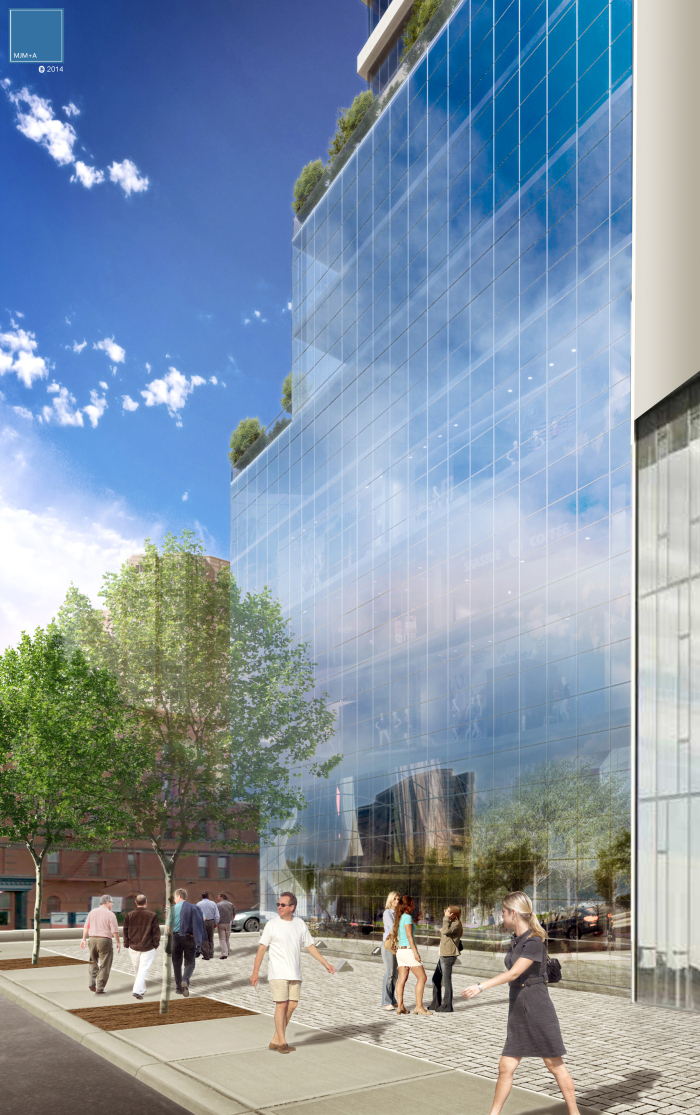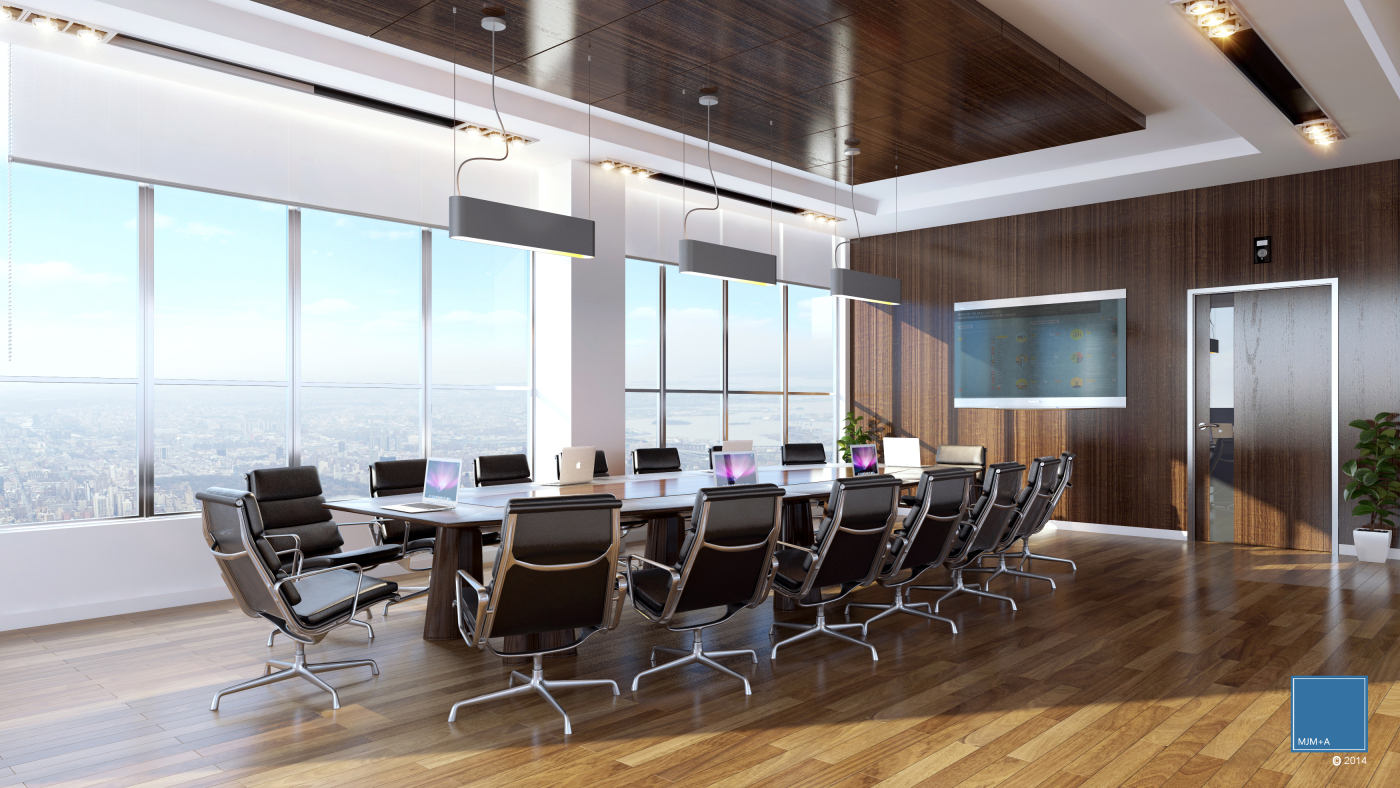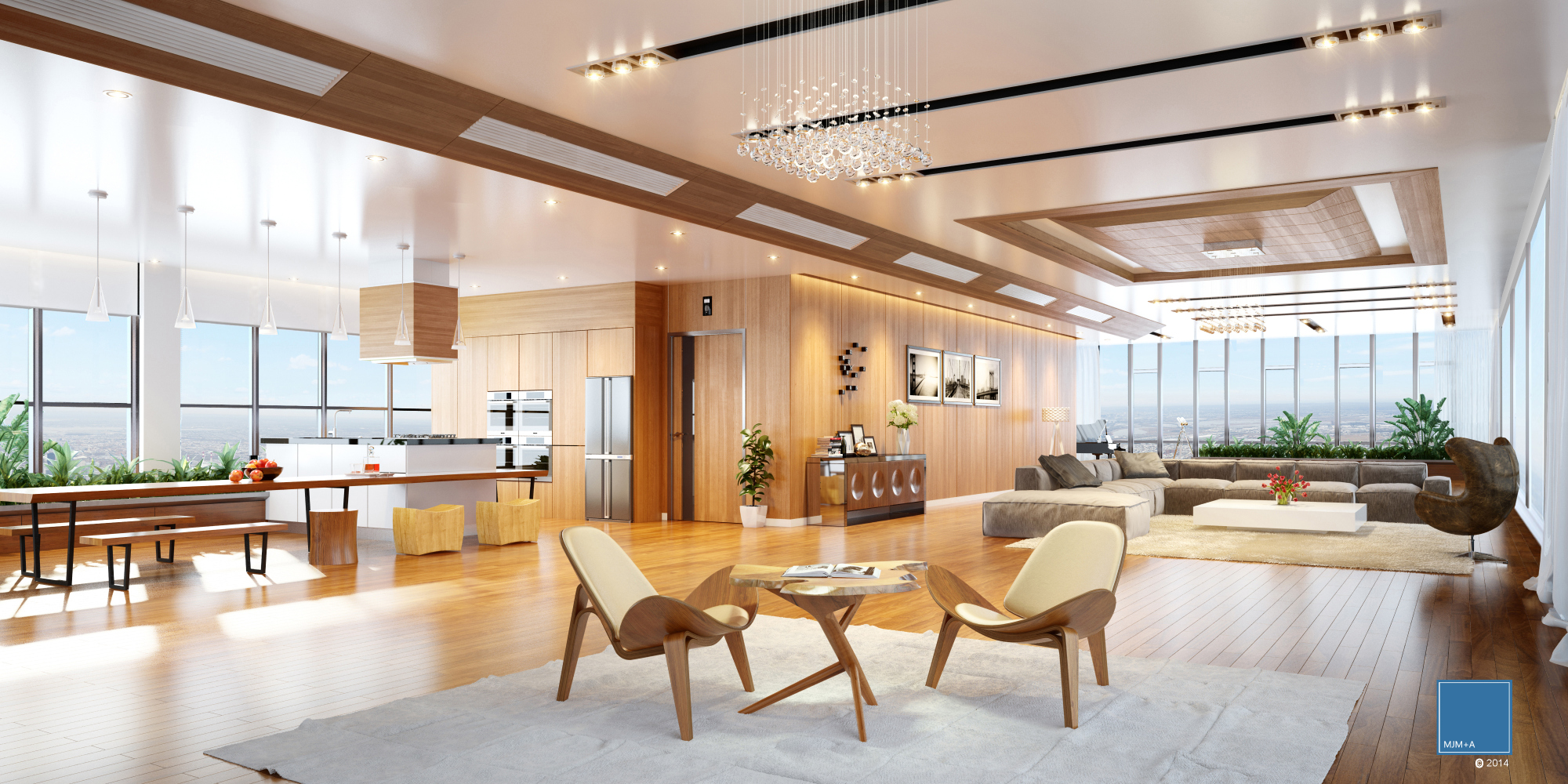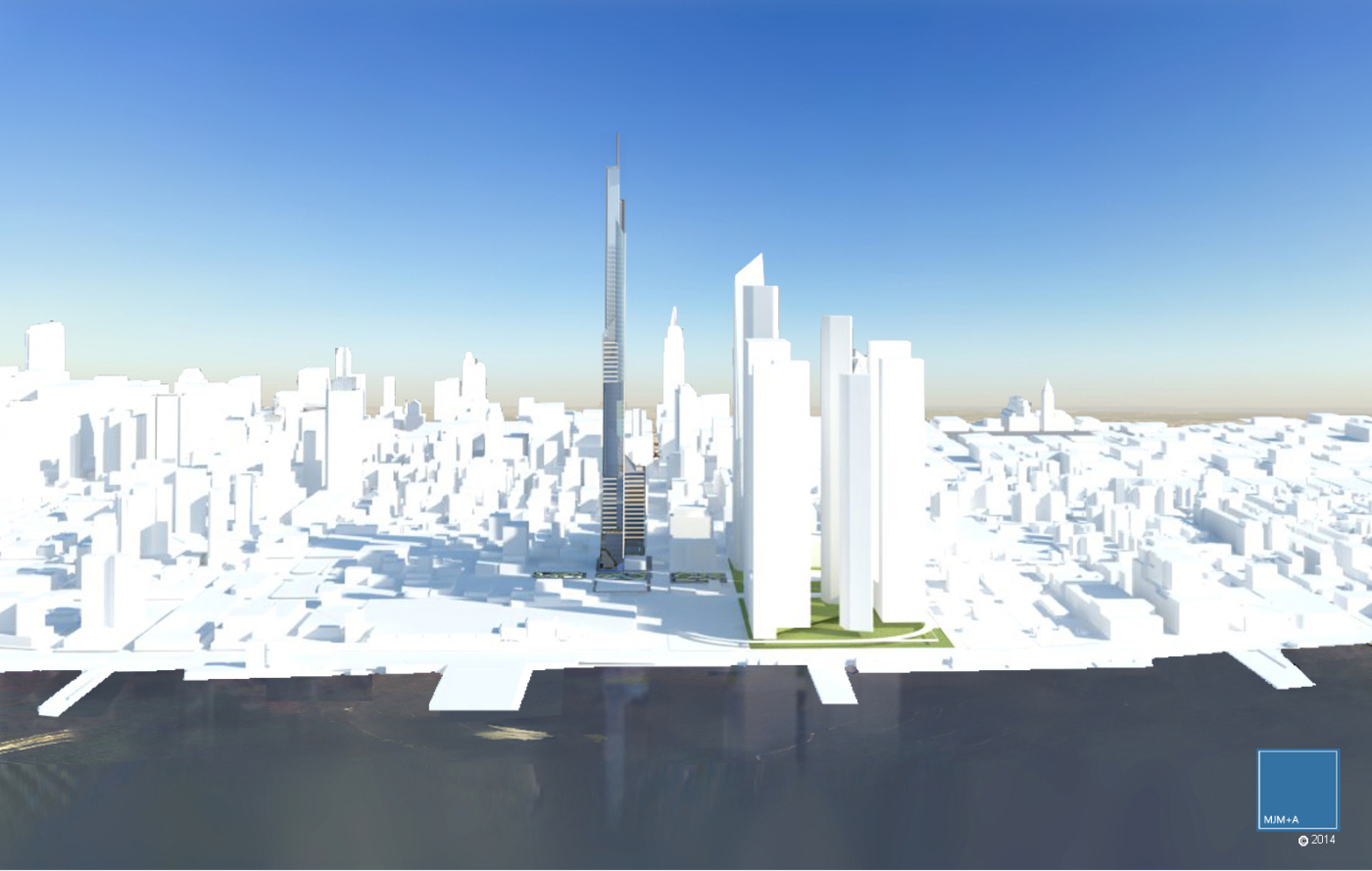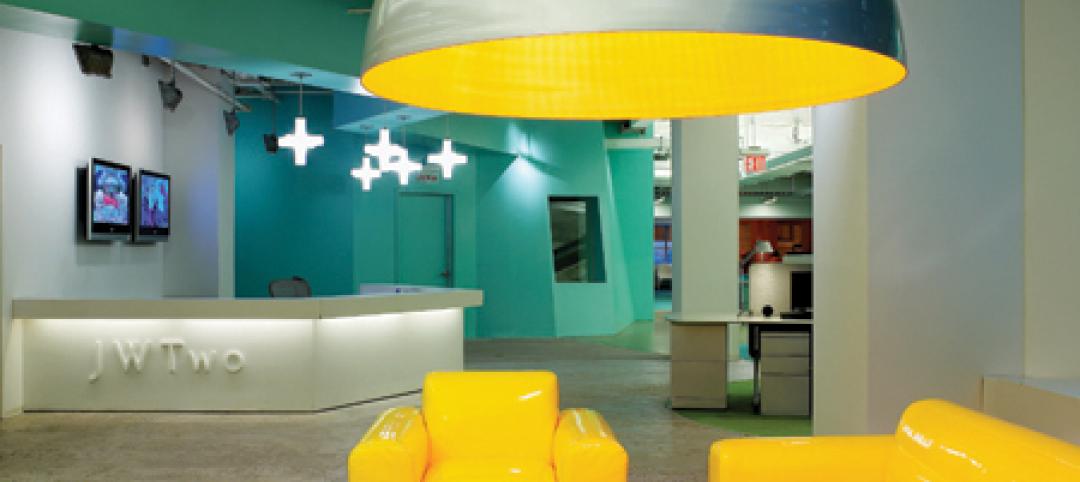MJM + A Architects recently unveiled its plans for the construction of Hudson Spire, a 1,800-foot-tall tower that would become the tallest building in North America.
The structure includes approximately 1.2 million sf for high-end retail, office, hotels, and residences in the heart of Hudson Yards, a dynamic new neighborhood and cultural center in development on 10th Avenue from 34th to 40th Street, on the site of what was formerly the West Side Rail Yards.
Hudson Spire would be on a section of the new Hudson Boulevard, overlooking a park-like public space that is the centerpiece of the neighborhood. The building will face the Hudson River and be less than two blocks from the Jacob Javits Convention Center.
Michael J. Macaluso, Principal and Founder of MJM + A Architects, was retained by the property owners and their exclusive real estate broker, Massey Knakal, to come up with a grand design for the building.
“This is a once-in-a-lifetime opportunity that architects dream of,” said Macaluso. “When the senior executives of Massey Knakal, James Nelson and Bob Knakal, and Anthony Volpe of the Rosenthal Group first laid out for us the challenge of creating an 1,800-foot-high mixed-use tower for Hudson Yards, we were both thrilled and inspired. As architects, our job is to interpret the dreams of others. The creative geniuses of our design studio, led by my partner Keith Lucas, came up with a stunning vision of a vibrant glass structure that literally jumps from its bases and soars to the stars.”
Hudson Spire is slated to have 110 stories, offering a unique combination of commercial and residential space. Floors one through five will host upscale restaurants and retailers, on top of which will be 15 stories of office space. Floors 21 through 85 are designated for three separate high-end hotel properties, each with approximately 200 guest rooms, lavish amenities, and event/conference space.
The top 25 floors will be luxury residences, with one or two units per floor, concierge service, private elevators, glass walls on all four sides, and stunning views that extend from the Statue of Liberty to the George Washington Bridge and beyond.
“Hudson Yard represents the last frontier in undeveloped Manhattan property,” said Macaluso, “and Hudson Spire will be right in the middle of this dynamic new neighborhood with all its cultural attractions, entertainment, and river views. And its close proximity to the Javits Center makes it an excellent choice for Fortune 500 executive travelers.”
Superthin skyscraper design
Hudson Spire follows the “super tall / super thin” strategy of other recent luxury high-rise residences, mandated by the space, cost and zoning realities of Manhattan property. Starting at a base width of approximately 100 feet, the edifice will be physically set back as it rises, tapering to just 75 feet in width at the top floors.
The structural challenges of high winds and complex elevator requirements are solved with a hybrid reinforced concrete and steel frame, encased by alternating reflective and non-reflective high powered glass.
“There’s not a lot of façade to work with,” said MJM + A's Lucas, “so we wanted to make it visually interesting. We decided, rather than go with a typical singular surface, let’s do something different and more dynamic. Let’s vary the composition of the glass color and reflective property, with lots of intersecting angles that play off one another, so that sunsets and city views will look different on one face of the building than on the others.”
At 1,800 feet, Hudson Spire will be even taller than the recently-constructed Freedom Tower at the World Trade Center. “Since 9/11, the city has gone through a long healing process. The owners of the property want to create a building that looks forward, not back, that will uplift the city but is unrelated to 9/11,” says Macaluso. “Hudson Spire reflects the dawn of a new age, emphasizing the global character of New York City as a business hub, a tourist destination, and the many foreign residents who now call it home. Hudson Spire will be a welcome addition to the Manhattan skyline, and to the spirit of the city itself.”
Related Stories
| Aug 11, 2010
Florida mixed-use complex includes retail, residential
The $325 million Atlantic Plaza II lifestyle center will be built on 8.5 acres in Delray Beach, Fla. Designed by Vander Ploeg & Associates, Boca Raton, the complex will include six buildings ranging from three to five stories and have 182,000 sf of restaurant and retail space. An additional 106,000 sf of Class A office space and a residential component including 197 apartments, townhouses, ...
| Aug 11, 2010
Restoration gives new life to New Formalism icon
The $30 million upgrade, restoration, and expansion of the Mark Taper Forum in Los Angeles was completed by the team of Rios Clementi Hale Studios (architect), Harley Ellis Devereaux (executive architect/MEP), KPFF (structural engineer), and Taisei Construction (GC). Work on the Welton Becket-designed 1967 complex included an overhaul of the auditorium, lighting, and acoustics.
| Aug 11, 2010
Best AEC Firms to Work For
2006 FreemanWhite Hnedak Bobo Group McCarthy Building Companies, Inc. Shawmut Design and Construction Walter P Moore 2007 Anshen+Allen Arup Bovis Lend Lease Cannon Design Jones Lang LaSalle Perkins+Will SmithGroup SSOE, Inc. Timothy Haahs & Associates, Inc. 2008 Gilbane Building Co. HDR KJWW Engineering Consultants Lord, Aeck & Sargent Mark G.
| Aug 11, 2010
High-Performance Workplaces
Building Teams around the world are finding that the workplace is changing radically, leading owners and tenants to reinvent corporate office buildings to compete more effectively on a global scale. The good news is that this means more renovation and reconstruction work at a time when new construction has stalled to a dribble.
| Aug 11, 2010
Great Solutions: Business Management
22. Commercial Properties Repositioned for University USE Tocci Building Companies is finding success in repositioning commercial properties for university use, and it expects the trend to continue. The firm's Capital Cove project in Providence, R.I., for instance, was originally designed by Elkus Manfredi (with design continued by HDS Architects) to be a mixed-use complex with private, market-...
| Aug 11, 2010
Nurturing the Community
The best seat in the house at the new Seahawks Stadium in Seattle isn't on the 50-yard line. It's in the southeast corner, at the very top of the upper bowl. "From there you have a corner-to-corner view of the field and an inspiring grasp of the surrounding city," says Kelly Kerns, project leader with architect/engineer Ellerbe Becket, Kansas City, Mo.
| Aug 11, 2010
AIA Course: Historic Masonry — Restoration and Renovation
Historic restoration and preservation efforts are accelerating throughout the U.S., thanks in part to available tax credits, awards programs, and green building trends. While these projects entail many different building components and systems, façade restoration—as the public face of these older structures—is a key focus. Earn 1.0 AIA learning unit by taking this free course from Building Design+Construction.
| Aug 11, 2010
BIM adoption tops 80% among the nation's largest AEC firms, according to BD+C's Giants 300 survey
The nation's largest architecture, engineering, and construction companies are on the BIM bandwagon in a big way, according to Building Design+Construction's premier Top 50 BIM Adopters ranking, published as part of the 2009 Giants 300 survey. Of the 320 AEC firms that participated in Giants survey, 83% report having at least one BIM seat license in house, half have more than 30 seats, and near...
| Aug 11, 2010
World's tallest all-wood residential structure opens in London
At nine stories, the Stadthaus apartment complex in East London is the world’s tallest residential structure constructed entirely in timber and one of the tallest all-wood buildings on the planet. The tower’s structural system consists of cross-laminated timber (CLT) panels pieced together to form load-bearing walls and floors. Even the elevator and stair shafts are constructed of prefabricated CLT.
| Aug 11, 2010
Integrated Project Delivery builds a brave, new BIM world
Three-dimensional information, such as that provided by building information modeling, allows all members of the Building Team to visualize the many components of a project and how they work together. BIM and other 3D tools convey the idea and intent of the designer to the entire Building Team and lay the groundwork for integrated project delivery.


